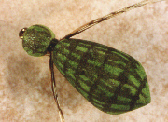This is usually the first set-up I'll go with, an experiment if you will, on which pattern is getting more attention. If the damselfly is taking the most trout, I'll change to a two fly damselfly set-up but if the dragonfly is drawing more attention then I'll generally change the set-up and replace the damselfly with a dragonfly sprawler and keep the foam darter on the point. Of course if I'm being lazy, I may just keep the damselfly on even if it's not catching (which tends to happen). The idea here is to set yourself up on the shoal, casting beyond the drop-off and stripping your presentation up the drop-off onto the shoal and getting your patterns as close to the bottom as possible. For shallower lakes that don't offer the drop-off transition, casting into deeper water and stripping your presentation up into shallow water using an intermediate sinking line also works well. Give it try, when the trout are hungry the action is awesome.
Here are some dragonfly nymph patterns you can tie up.
 |
| Fly Craft Angling (Foam Sprawler) |



1 comment:
This is very interesting blog, I didn't know this could be a great options. I may try the same way soon when i am out for my next fishing trip.
Thanks for this informative blog.
Post a Comment